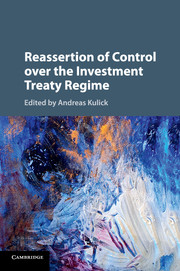Book contents
- Frontmatter
- Contents
- List of Contributors
- Preface
- PART I Introduction, Theory and Domestic Law Approaches
- PART II Procedural Aspects and Avenues of Reassertion
- PART III Substantive Aspects and Avenues of Reassertion
- PART IV Reassertion of Control: Policy and Trends
- 12 States' Reassertion of Control over International Investment Law: (Re)Defining ‘Fair and Equitable Treatment’ and ‘Indirect Expropriation’
- 13 How the European Commission and the EU Member States are Reasserting Their Control over Their Investment Treaties and ISDS Rules
- 14 Arbitrator Selection: Towards Greater State Control
- 15 Arbitrator (Issue) Challenge:What's the Real Issue?
- Index
13 - How the European Commission and the EU Member States are Reasserting Their Control over Their Investment Treaties and ISDS Rules
from PART IV - Reassertion of Control: Policy and Trends
Published online by Cambridge University Press: 12 January 2017
- Frontmatter
- Contents
- List of Contributors
- Preface
- PART I Introduction, Theory and Domestic Law Approaches
- PART II Procedural Aspects and Avenues of Reassertion
- PART III Substantive Aspects and Avenues of Reassertion
- PART IV Reassertion of Control: Policy and Trends
- 12 States' Reassertion of Control over International Investment Law: (Re)Defining ‘Fair and Equitable Treatment’ and ‘Indirect Expropriation’
- 13 How the European Commission and the EU Member States are Reasserting Their Control over Their Investment Treaties and ISDS Rules
- 14 Arbitrator Selection: Towards Greater State Control
- 15 Arbitrator (Issue) Challenge:What's the Real Issue?
- Index
Summary
A. Setting the Scene
Over the past fifty years, States have signed and ratified more than 3,300 investment treaties – either in the form of bilateral investment treaties (BITs) or free trade agreements (FTAs) with an investment protection chapter. With the exception of the very early BITs (e.g. the Germany–Pakistan BIT of 1959 and the Netherlands–Cameroon BIT of 1966) and the famous US–Australia FTA (which entered into force in 2005), most of the more than 3,300 existing investment treaties contain some form of dispute settlement rules, usually including investor-State dispute settlement (ISDS).
By signing and ratifying investment treaties, States have consciously consented to the possibility that investors could bring a claim against them. Apparently, there was and is consensus that concluding investment treaties is beneficial for both Contracting Parties. In fact, States continue to negotiate, sign and ratify investment treaties. Indeed, recent studies show that after ratification of a BIT, foreign direct investment (FDI) flows increase on average by about 30 per cent.
However, as the United Nations Conference on Trade and Development (UNCTAD) and the European Commission repeatedly have noted, it cannot be denied that an increasing uneasiness is felt within States, governments, parliaments and certain non-governmental organisations (NGOs) about ISDS and investment treaties. The public debate, though based largely on misperceptions and misrepresentations, has triggered a drive to reform the current ISDS system. In this context, it is important to note that this drive to reform is not limited to Europe but is also taking place in some of the BRICS (Brazil, Russia, India, China and South Africa) countries. For example, Brazil has concluded BITs on the basis of a new model text which does not include ISDS. India has recently published its new Model BIT, which departs significantly from the current ISDS system. Also, South Africa has moved away from ‘old school’ BITs by terminating many of them with EU Member States and replacing them with a new domestic investment law.
More recently, within the context of the Transatlantic Trade and Investment Partnership (TTIP) negotiation, the European Commission has proposed the creation of an Investment Court System (ICS) that would create a semi-permanent two-tier court system, which would constitute a significant departure from the existing ISDS system. Indeed, the FTA between Canada and the European Union (Comprehensive Economic and Trade Agreement (CETA)) already contains the ICS proposal.
- Type
- Chapter
- Information
- Reassertion of Control over the Investment Treaty Regime , pp. 309 - 332Publisher: Cambridge University PressPrint publication year: 2016
- 7
- Cited by

